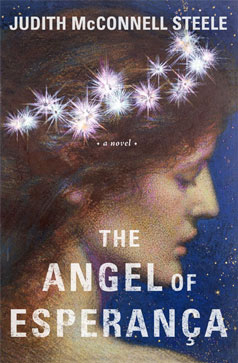About Angel
Excerpt

Late at night, in the faraway town of Esperança, a light burns in a lonely tower. A warm wind drifting through the town carries the mournful notes of the woman in the tower. Her voice rises into the wind, rippling the fronds of the coconut trees lining the town square, then drops low, insistent.
The people know who is shut in the tower. They never mention a name, afraid that to talk about the moans would make them louder. The sound invades their sleep. Men take their hammocks inside and hang them on hooks sunk deep in mud and wattle walls, close wooden shutters even when the air is stifling. Women stuff their ears with bits ripped from their handkerchiefs, welcome their babies' cries in the night to drown out the dreadful laments.
On nights when there is no light in the tower, the townspeople awake refreshed and nervous— "Has she run away? Is she dead?" The next night, the crying starts up, reassuring the town that all is as before. They will not sleep; their master will have no rest. He will come to his factory with his hair wild and his suit rumpled. He will stare at them with burning eyes and work them half to death or not at all. All will be exactly as it has been for the last five weeks.
Before Helena was shut in the tower, Esperança lived up to its name, "Hope."
It is not a beautiful town, flung onto the vast plain like a tattered map lying in the gutter. Still, it has its own squat church, hunkered on one side of the square, and Dona Ana's mercantile and bar slung along the other side like the devil's choice. A few of the mud houses lining the flat streets are spread with a prosperous layer of white plaster. Red tile roofs have replaced some of the palm thatch.
Women waiting for their morning coffee to boil on kerosene burners can buy fresh sugar buns from a neighbor's backyard oven. Men walking home from a hot day in the cement factory south of town can pay two centavos for a banana popsicle from a refrigerator set on a friend's front porch.
Dirt streets start out purposefully from the dusty square but soon meander off into the dry land that stretches from the ocean east of Esperança to the western jungle that looms green and hungry in people's dreams. The main street gives out north of town at the banks of the sadly misnamed Rio Branco which flows muddy brown most of the year. In the great rains, when water pours from God's grey metal pitcher, the river churns up out of its banks, traditionally taking along several mud houses with it. Always the same houses.
The occupants accept their fate, rebuild in a day. They are fishermen, marked by the gouged rings of flesh torn from their legs and hands by the piranhas living in the Rio Branco. The fishermen wade out every day except Sunday, praying to all their gods to send them anything but piranhas in their nets.
They are the only men not working in Sr. Machado's cement factory. They sell their catfish and soapfish to the maids in his large house, to Dona Ana, to housewives looking for something fresh for the midday meal.
Occasionally, they sell their catch to the captains of the two large canoes chugging down river every Friday with their precious cargo of girls dressed in the tidy blue and white uniforms of the Escola de Nossa Senhora.
Every Monday morning, the same canoes, painted with scenes from the Blessed Mother's life, pass Esperança on their way from the capital city to Nossa Senhora. The girls, shaded by striped canvas awnings, sit facing each other on long benches built into the boats' curving hulls. They drink cafezinhos laced with creamy milk and brown chunk sugar, eat the glazed buns served on a silver tray by two cabin boys in white waiter jackets. They gaze dreamily at Esperança and think about the prince who rode away with their Helena.
The canoes sway through the water, urged on by their pulsing engines. The girls ride without concern out of their mothers' arms and pretty villas in the dirty capital city to the pristine rooms and courtyards of the school where they learn penmanship, needlework, piano and voice, how to set a tea table and how to mount a horse.
It was from the river bank that Sr. Machado first glimpsed the lovely Helena. He was riding his horse, Ouro Preto, near the water's edge on a placid afternoon when the first canoe from the Escola de Nossa Senhora rounded an upstream bend in the river and floated past him. She was seated on the bench nearest him, facing away. All he saw was a glossy brown braid lying against a slender neck.
The next Monday, he was up before dawn, driving his cook frantic with orders for the whitest shirt and the hottest cafezinho. He arrived early at the bank of the Rio Branco. Ouro Preto, sensing his master's nerves, paced and pranced until the canoe's engine sounded its arrival.
She sat in exactly the same spot on the same bench. Just as she glided by him, she turned to speak to a classmate seated next to her, and he saw her graceful profile. He stayed on the bank, still mounted on the now quiet Ouro, long after the canoe was gone, long after the sun was high, contemplating that profile. He knew he must have her. He knew, for the first time since he was a child, that something he wanted might be denied him.
The next Friday, when the canoe rounded the bend, he thought for one moment that she wasn't on board. Then he realized that she had chosen a seat on the opposite side, that she was, as the boat slid by in a long glissando, looking at him. The answer in her blue eyes was "Yes" and "Yes."
Reviews
Judith Steele writes prose like a visionary angel, prose that delights with imagery and hypnotizes with seamless narration, flowing as naturally as the river beside her little town of Esperanҫa. Reminiscent of Gabriel Garcia Marquez, Steele reinvents the mythic tale of star-crossed lovers in a sleepy town beset by mysterious events that bemuse and dislocate with tragic consequences. Mesmerizing in its scope and originality, the story reminds us what draws us to read novels and experience wonder at the ways of the world. You'll fall in love with this dark prince and the fair young princess he woos and marries, a young woman warned by her mother to never cut her hair for it will wind itself around her husband's heart and hold him close to her forever…
—Jonis Agee, author of 13 books including Strange Angels and The River Wife, professor of creative writing and 20th-century fiction at the University of Nebraska.From the haunting opening to the searing conclusion The Angel of Esperanҫa explores the ecology of emotion. This elegantly expressed story of romantic, filial, maternal and familial love virtually shimmers on the page. It exists in a nameless country in an undefined recent past. The plot is a fable of love, loss and redemption. Judith McConnell Steele's novel can be read in a sitting. The narrative is executed with a precise and sure hand, the writing is elegant, the characters complex and the setting casts a magical glow. This is grand fiction writing--immersive and rewarding.
—Alan Minskoff, poet of Blue Ink Runs Out on a Partly Cloudy Day and Point Blank, director of journalism at the College of Idaho.Judith McConnell Steele's The Angel of Esperanҫa casts a spell like a gossamer net. Every word, every character, every double-door detail offers magic, emotion and meaning. This reader was too gladly captured.
—Clay Morgan, author of Santiago and the Drinking Party and The Boy Who Spoke Dog, Boise State University writing professor and director of The Story Initiative.This new telling of La Llorona begins 'Late at night, in the faraway town' and doesn't let you go until it's finished with you. Fantastic!
—Josephine Jones, poet, author of Sane in Pain, Colorado Humanities Director of Programs and Center for the Book....Steele weaves a mythic tale of love, tragedy, faith and redemption....a book filled with tenderly developed characters, a page-turning plot, and language as rich as the tale itself.
—The Idaho Statesman
Reader Reviews
Young and beautiful, Helena captures the heart of dashing Robert Machado. He brings his bride back to the parched town of Esperanҫa where she enjoys a full life as wife, mother and artist. But tragedy strikes, and she is consumed with guilt and grief that touches everyone around her. The story is intriguing and beautifully written with each word chosen with care. The book is difficult to put down and even harder to get out of one's mind. The characters are well-drawn and unforgettable, and the setting is brought to life with vivid description.
— Jim V., Aug. 16, 2013The author must be a poet - each page contains lyrical passages that seem more like a poem or ballad than a novel....The book contains beautiful descriptions of the scenery, food, fashion, and customs that support the characters.
— Amber, Oct. 21.In this novel, love masquerades in its many disguises, and leads to unexpected outcomes in the shadow of the Angel of Esperanҫa. Set in the hot, fecund tropics of Brazil, the lushness of this story comes into its fullness as beautiful Helena leaves her family and enters in a marriage with dashing Roberto. Both are flawed by their encounters with love. Their imperfect interpretations seep into their marriage, resulting in misplaced love, betrayal, loss and madness. Every turn of fortune urges the reader onward into a tight downward spiral. Brilliantly written and thoroughly engaging, this is a beautiful first novel.
— Sheila D., Boise, Nov. 25.I loved this beautiful jewel of a book. The details of life in the unnamed Latin plantation setting sparkle, especially the backstage realm of women - food and drink that make the mouth water, the small crafts they are permitted to master and their relationship with children. The enthralling story is one of tragedy, love and the capability of the heart; timeless and mythological. Grace is the best word I can use to describe the ending.
— Seattleheart, Dec.2.I was captivated by the exquisite style and prose that tells the story of Helena's life and loves. Like all flawed beings, the characters fail each other. I could really feel for Helena and only hope for such peace that the tincture of time brings, but was surprised at how the greatest of mistakes and shame were overcome by mercy and compassion. I loved The Angel of Esperanҫa and am eager to read future books by Judith Steele.
— Milli, Dec. 2.Loved this book!! Could not put it down the imagery is haunting and beautiful; the emotions are visceral; the story is mesmerizing. The ending brings life, love, loss, hope full circle. A must read!!
— S. Page "Mile Post 34," Spokane, Dec. 4.
Awards
- Best Fiction - Idaho Book Awards, Nov. 21, 2013
- Best Cover - Idaho Book Awards, Nov. 21, 2013
- Best Interior Design - Idaho Book Awards, Nov. 21, 2013
- Fiction, second place, international North American Book Awards, Nov. 13, 2014





